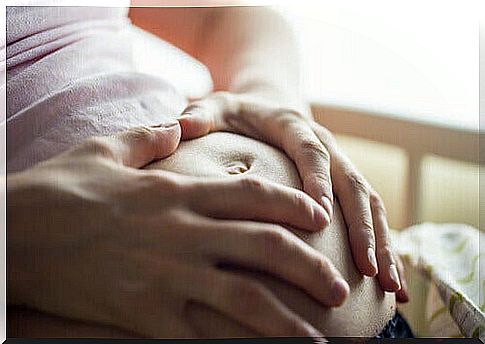7 Keys To Promoting A Relaxed Childhood

Stress does not know ages. This is why our children can also be stressed, even before birth. During childhood, triggers are usually circumstances which, while they may seem harmless to adults, present a real challenge for them. Hence the importance of promoting a relaxed childhood in order to guarantee an adult life without anxiety.
Separation from parents when they go to school, a reprimand from the teacher, arguing with friends at recess, punishment for not eating what’s on the plate or sleeping alone. These are small problems that the child must solve day by day with the resources at his disposal. Resources that are still scarce. Young children have not yet reached sufficient maturation to cope with this stress.
Pregnancy without stress
Michel Odent, a well-known French obstetrician, has devoted most of his life to studying how pregnancy and childbirth influence the emotional development of the child. This doctor maintains that the emotional state of the pregnant woman has more influence, in the long term, in the child than the emotional state of the latter during its first year of life.
With this statement, we realize that any external agent that can generate stress for the mother has a greater or lesser impact on the fetus.

The woman faces, during pregnancy, specific moments of nervousness: submission to tests, embarrassment, worries … However, these should not harm the fetus if they are occasional. It is only when stress is maintained for a long period of time that it can harm both mother and child physically and mentally.
Be careful with teratogens
The prenatal environment of the uterus is much more constant than the outside world. I here are still many types of environmental factors that can affect the embryo and disrupt a relaxed childhood. These are the so-called teratogens. By reaching the child they can cause, directly or indirectly, structural or functional abnormalities, even after birth.
The consequences that teratogens can cause can be very serious. Indeed, they can cause low birth weight and prematurity, or even cause deformities, physical defects or even death. Therefore, parents and society have a lot to do to create a safe environment for development before birth.
Some of these teratogens are psychoactive substances. The best known effect of tobacco nicotine during pregnancy is low birth weight. But it can also cause an abortion. In addition, radiation, environmental pollution or bacterial and parasitic diseases such as toxoplasmosis, chickenpox or mumps are all factors to be taken into consideration.
Adequate nutrition for the mother
A mother’s balanced and adequate diet before and during pregnancy is fundamental for the healthy development of the child in the womb and for the child to be prepared for the moment of birth. Moreover, the nutritional state in which the mother finds herself before pregnancy has a greater influence on the baby’s weight than her weight gain during the gestation process.
If the pregnant woman has nutritional deficiencies, it will be difficult for the child to enjoy a relaxed childhood. Some effects of this malnutrition are the reduction of the immunological effectiveness of the baby, prematurity or the interruption of the development of the nervous system.
Natural and respectful childbirth for a relaxed childhood
The birth of a baby is a very stressful and “traumatic” time (Otto Rank, 1923). The creature exchanges a protective and dependent uterine environment for an external environment in which it must breathe on its own. The baby has to cope with a drop in temperature, changes in light, different sound effects and also face a certain autonomy.
Science has shown that natural childbirth is healthier for both baby and mother. Indeed, this method makes it possible not to resort to the administration of synthetic hormones. For example, synthetic oxytocin which can cause certain difficulties. But, even if the birth is not initiated, the baby continues to receive the impact of this new means.

In addition, in order to promote a relaxed childhood, it is necessary to generate favorable conditions for the development of the child. After childbirth, it is important that the newborn properly adapts its internal regulatory system, both visceral and nervous.
The first hour, skin to skin
What a beautiful moment! That moment when the newborn is brought into skin-to-skin contact on the mother’s chest. Early physical contact has been shown to improve breastfeeding and promote a relaxed childhood as it helps the child not feel too much stress in the hours following childbirth.
The ecological transition also occurs at this time (Bronfenbrenner, 1979). In other words, the moment when the physical coupling between the maternal body and that of the fetus during pregnancy is replaced, after childbirth, by one of a psychological nature.
The second nine months
After birth, comes extero-gestation, the baby’s first nine months. This is a stage in which the child continues to “grow” outside the womb.
The mother becomes her physiological and emotional regulator, causing the latter to pay attention to everything she transmits to her. Therefore, if we are stressed, the baby can reproduce the same toxic response.
Adult Protection Network
As the child grows, so do their social relationships and those around them. It is therefore necessary for it to have a certain number of reference adults forming its protection and support network.
This does not mean that it is overprotected, but that it has a point of support to overcome any difficulties. Instead of showing hypersensitivity to stress, his childhood will allow him to develop resilience, the ability to overcome adversity.
If for some reason the child does generate a stress response, their primary attachment figure will act as a shock absorber. He will therefore suffer more if he does not have this adult confinement which gives him love, care and protects him. It is only with this barrier of submission that he will be able to benefit from a relaxed childhood.










